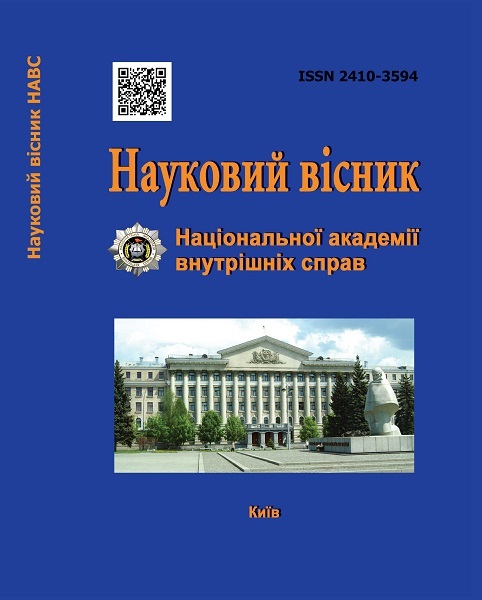Preventing Corruption Offenses Committed by Police
Abstract
The purpose of this article is to reveal the legal content of the term «corruption crime» through the prism of domestic and international law, formulation of key determinants for criminal offences of corruption the police on the basis of questionnaire data. Methods. Regarding the Commission of corruption crimes by the officials of law enforcement agencies testify to the successful use of the method of questioning and interviewing. Methodology. Due to the method of analysis and synthesis were able to structure the international legal acts in the sphere of combating corruption, the dialectical method gave the opportunity to form the basic conceptual and categorical framework of anti-corruption legislation, highlighting key definitions. Scientific novelty. The article author gives a private approach to the identification of signs of corruption crimes through analysis of doctrinal opinions and self-generated insights and proposals for possible ways of improvement. In particular, it is proposed in the theoretical plan to understand the criminal
punishments envisaged by the Criminal Code of Ukraine as socially dangerous and punishable intentional acts that contain signs of corruption and committed by special subjects. Conclusions. On the basis of the analysis highlighted the causal relationships and the negative consequences of corruption offenses committed by police officers. It has been established that police officers are most susceptible to committing such corruption offenses as abuse of office, illegal gain, excess of authority or official authority, and official negligence. The overwhelming motivation for crimes committed in the field of official activity by National Police officers is: the desire to raise their material standard of living; the desire to satisfy psychological needs (self-expression, achievement of career growth, etc.); the desire to live
«wide leg».
Keywords: crime; official activity; corruption; policeman; abuse; official position; official; counteraction.
Downloads
Abstract views: 142 PDF Downloads: 150
- Authors reserve the right to authorship of their own work and transfer to the magazine the right of the first publication of this work under the terms of the Creative Commons Attribution License, which allows other persons to freely distribute published work with mandatory reference to authors of the original work and the first publication of an article in this magazine.
- Authors have the right to enter into separate additional agreements on non-exclusive dissemination of the work in the form in which it was published in the journal (for example, to post an article in the institution's repository or to publish as part of a monograph), provided that the link to the first publication of the work in this journal is maintained.
- The journal's policy allows and encourages the posting of articles by authors on the Internet (for example, in electronic storehouses of institutions or on personal websites), both before the submission of this manuscript to the editorial office and during its editorial processing, as this contributes to the creation of a productive scientific discussion and positively affects the efficiency and dynamics of citing the published work.




